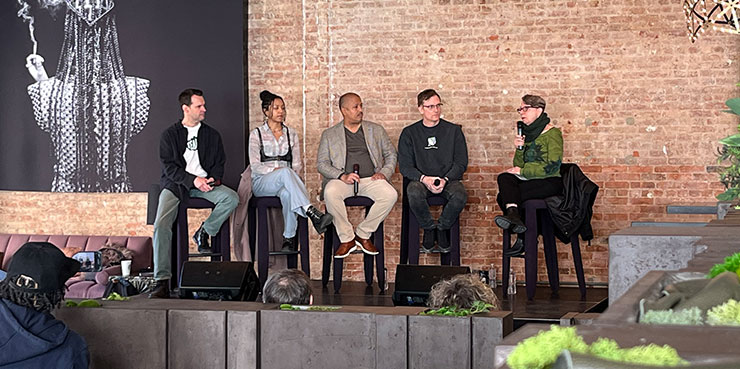
Ever since legalizing adult-use marijuana in March of 2021, the NY industry has been bustling with litigation, getting recreational license applications ready to go and the illicit market. So much has happened over the last few years that many cannabis businesses have found it hard keeping up with it all.
To bring everyone in the industry up to speed, the MARY Speaker Summit kicked off February in the heart of NY with a full day of panel discussions featuring experts and thought leaders across the cannabis industry. Talking about all things marijuana, lifestyle, food and beverages and community, they covered a little bit of everything.
New York: America’s Next Cannabis Capital
Starting off the day was Tremaine Wright, Chair to New York’s Office of Cannabis Management; Mary Pryor, Founder of Self Care Is A Habit and Cannaclusive; Joann Kudrewicz, Co-founder of Ravens View Genetics and Sara Brittany Somerset, UN & Cannabis Correspondent discussing New York as America’s next cannabis capital.
“We’ve been hit with a lot of litigation, which doesn’t help us,” said Wright. “Any of us that have opened a business from nothing knows it can’t be done in three months. We’re starting to see them now open their doors and the state is addressing these concerns. We’re educating people so they can open up a legal store.”
It takes a lot to open up a cannabis business, especially since there’s no rulebook explaining where you need to start and how things should be done. Everyone who has successfully started a business has done an incredible amount of research on their own or hired someone to do it for them.
If you don’t know what you’re doing and don’t want to hire someone to do the research for you, Pryor suggests that you try another industry.
“I would not open a plant-touching business,” she noted. “You see what’s happening in NY. If you don’t know how to raise money, you shouldn’t open up a business. All of the funds that came out two years ago aren’t around anymore. And all of the funds that people thought existed don’t. I would not open a plant-touching business in NY if you can’t fund it yourself.”

Cannabis Business Advice
Brytany Melville, Founder of Cannabis Dispensary Consulting, has been in traditional retail for about 17 years. With the last six years of her professional career being spent in cannabis retail, she said it has been the most challenging.
The next panel of the day focused on everything you need to know about cannabis business regulations.
“Cannabis retail is completely different, so I think being ready to be in this for the long haul is extremely important,” said Melville. “If you’re first to market, you might be lucky to cash in right away with your store getting busy, but remember to set your store up for the long haul because the market will saturate. Start planning and having conversations with people who have been in this industry — who have been through the hiccups and the failures.”
Dave Vautrin, Operating Partner at The Travel Agency, noted that location is key when choosing where to open your dispensary. “Thirty-five percent of consumers pick their dispensary based on convenience, so despite how we think we perform, convenience is a key factor,” he said.
Another very important factor when opening up your cannabis business is to have an attorney. “Thought leadership is critical. There is so much to be learned and you cannot learn it all on your own,” said David Holland, Partner to Prince Lobel. “You must speak with an attorney about business processes and let them guide you.”
The best piece of advice that everyone on the panel agreed on? Reach out to experienced professionals in the cannabis industry and ask them questions.
“Ask questions to the people and resources around you and involve anybody in your team with a different skill set than you have to ultimately strengthen your business approach,” Melville advised.

Cannabis-Infused Food and Beverages
Edibles and infused beverages are two rapidly growing categories — and many businesses are trying to capitalize on their popularity.
“You can put cannabis in virtually anything, and with a little bit of food science, you can make anything,” said Paul Weaver, Director – Head of Cannabis at The Boston Beer Company.
Due to the increased popularity of the infused food and beverages market, experts discussed the importance of weeding out the illicit market.
“I’m way more spooked by an illegal gummy than a legal gummy,” Weaver stated. “You don’t know the safety, the accuracy of the dosage, its shelf life, where it was made or if the people are washing their hands. There’s a reason why there’s oversight with food products.”
Breanna Neff, Founder and Chief Food Scientist of Brelixi, also said that unregulated flower can be quite unnerving since you are inhaling substances that might be approved or added in to enhance the flavor and aroma.
“It’s super important to make sure you have lab results,” Neff advised. “All packaging should have a scannable QR code that goes right to the lab results. There are also now fake approval stickers out on bodegas, so you really have to watch out.”
Emerging Culinary Cannabis Trends
Particularly in the beverages sector, Weaver said non-carbonated drinks are expected to be quite popular.
“There’s a reason why most of the THC drinks that have come out are all seltzers,” he noted. “Hard seltzer is a big thing in alcohol, and it’s also easier to make a flavored seltzer water than it is to make non-carbonated drinks.”
Another trend that Neff mentioned is emerging is utilizing functional ingredients.
“We’re seeing more and more innovation in cannabis products, which is really just to meet market demand,” she said. “We’re seeing more health conscious consumers out there. Because of COVID, everyone cares about their supplemental health, so the industry is responding with functional ingredients that are being combined with cannabis.”









